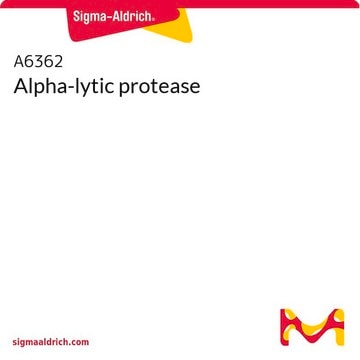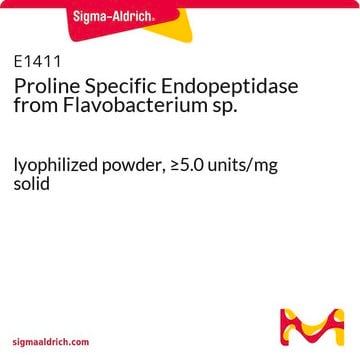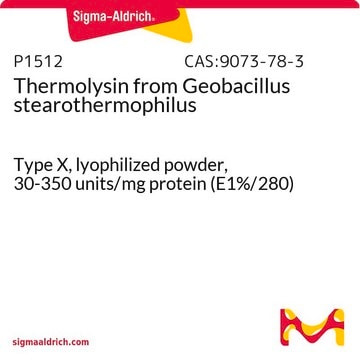A6487
Alpha-Lytic Protease M190A Mutant
Synonym(s):
Alpha-Lytic Protease M190A Mutant, ALP M190A
About This Item
Recommended Products
recombinant
expressed in E. coli
form
liquid
specific activity
≥0.05 U/mg
mol wt
19.8 kDa (mature form)
optimum pH
5.0(storage)
7.5(activity)
pI
9.69
shipped in
dry ice
Storage temp.
−70°C
General description
In WT aLP, the methionines at positions 190 and 213 cause WT aTP to have its particular specificity toward peptide substrates with small hydrophobic side chains at the P1 position. The M190A mutation gives the resulting mutant M190A aLP the ability to cleave peptide substrates with large hydrophobic side chains at the P1 side chain with greater efficiency compared to WT aLP, in addition to accommodating peptides with small hydrophobic side chains as before. Other structural changes in M190A aLP compared to WT aLP have been discussed.
The activity of M190A aLP in the presence of various solution components is as follows:
- 0.1% sodium deoxycholate: ~1.4-fold enhanced activity
- 1.0% sodium deoxycholate: nearly full activity
- 0.1% SDS: ~40% activity
- 1.0% SDS: ~30% activity
- 1 M guanidine HCl: ~20% activity
- 4 M guanidine HCl: ~1% activity (essentially inactivated)
Unit Definition
related product
Storage Class
12 - Non Combustible Liquids
wgk_germany
WGK 1
flash_point_f
Not applicable
flash_point_c
Not applicable
Choose from one of the most recent versions:
Certificates of Analysis (COA)
Don't see the Right Version?
If you require a particular version, you can look up a specific certificate by the Lot or Batch number.
Already Own This Product?
Find documentation for the products that you have recently purchased in the Document Library.
Active Filters
Our team of scientists has experience in all areas of research including Life Science, Material Science, Chemical Synthesis, Chromatography, Analytical and many others.
Contact Technical Service






